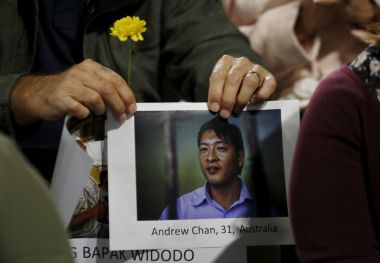Bali Nine case sparks Australian campaign to end capital punishment around the world

A campaign to abolish the death penalty around the world is gathering pace in Australia following the execution of two convicted drug traffickers in Bali.
The ringleaders of the 'Bali Nine', Australians Andrew Chan and Myuran Sukumaran, were executed by firing squad on April 29 after 10 years in prison. Both of them had converted to Christianity in prison and Chan had become a prison pastor, while Sukumaran had gained a degree in fine arts. Each had expressed a wish to see a global campaign against the death penalty.
Their cases had aroused strong feelings in Australia, with a high-profile campaign against their sentences in which Foreign Minister Julie Bishop was a leading figure. Bishop said last week: "It is time for us to have a significant discussion about the application of the death penalty for drug offences in our region." Australian Churches also backed the campaign, with the President of the Uniting Church, Rev Dr Andrew Dutney, saying: "The Uniting Church in Australia opposes capital punishment and stands against the death penalty, be it in Indonesia, the United States, China or wherever it exists."
However, while Australia has not executed anyone since 1967, support for the death penalty in principle remains relatively strong, with more than half the respondents in a Roy Morgan Research poll saying that the death penalty should be carried out if Australians were sentenced to death following conviction in another country.
However, a Lowy poll conducted in February this year showed that 62 per cent of people did not want Chan and Sukumaran to be executed, and nearly 70 per cent believed the death penalty should not be used to punish drug traffickers.
Australia's position on the death penalty for Chan and Sukumaran was perceived to have been compromised by its implicit support for the execution of the Bali bombers condemned to death in 2003, when the then prime minister, John Howard, declined to press for their reprieve.
The president of the Australian Human Rights Commission, Gillian Triggs, told Guardian Australia: ""My personal view is that anger is never very helpful, revenge isn't helpful. We should take this opportunity in a positive way to reach consensus among Asian nations that we should never do this again. We will certainly be working with groups in Indonesia and Malaysia so that we can come together for a unified view on capital punishment."
Australia straddles two regions of the globe with markedly different approaches to capital punishment. The Pacific region is de facto free of the death penalty, while Asia executes more people than anyone in the world: China does not release statistics, but is thought to have put to death 1,000 people last year.











